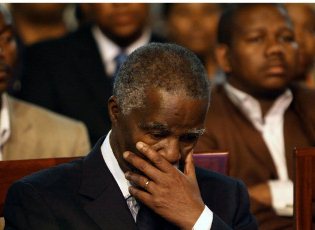South Sudan official calls for removal of Mbeki from mediation process
April 28, 2012 (JUBA) – South Sudanese officials and senior figures of the ruling party in Juba on Saturday added to calls for the removal of Thabo Mbeki, the chair of the African Union High Implementation Panel which has been mediating conflict resolution talks between Juba and Khartoum.

Earlier this month, the spokesperson of South Sudanese government, Barnaba Marial Benjamin, travelled to Nairobi asking Kenya to support Juba’s efforts to bring the Intergovernmental Authority on Development (IGAD) to mediate their disputes with Khartoum instead of the AU panel.
He further voiced open frustration with the current mediation saying his government was unhappy not only with the AU report to the UN Security Council about the recent border clashes but also with the overall mediating process.
The issue of Mbeki panel was discussed at a public debate hosted by Radio Bakhita in Juba where all the participants agreed on the need to remove Mbeki’s panel. They further expressed doubts about its credibility and backed the idea of calling on IGAD to mediate the process.
Chargé d’Affairs in the South Sudanese embassy in Kenya, John Andruga, on Friday was the first to direct his criticism against the former South African president saying that Mbeki is “partisan and not credible” and described the African Union as incompetent.
He said that one should “never put new wine in an old bottle”; that new talks should begin with a new mediator as the current one has “lost credibility” and has been “blocking” progress in the negotiations.
Lual Diing Wol, senior member of South Sudan’s governing Sudan People’s Liberation Movement (SPLM) also expressed his concern about Mbeki’s credibility and impartiality, suggesting the Inter-Governmental Authority on Development (IGAD) take over the mediation.
Biel Jok, deputy-chair of South Sudan Human Rights Commission also recommended IGAD replace the AU as mediator. He underscored that it is was East-African-block IGAD which brokered the 2005 peace deal.
In a press conference he held at the premises of human right commission on Thursday 26 April, Jok said the issues to be discussed by Juba and Khartoum are stipulations of the Comprehensive Peace Agreement, which ended Sudan’s civil war in 2005, and remain unimplemented by Khartoum’s ruling National Congress Party (NCP).
Hendry Ukec, a member of the South Sudan National Legislative Assembly from Upper Nile State questioned Mbeki’s neutrality, and accused him in statement to Sudan Tribune on Saturday of selling arms to Khartoum.
He said the parliament discussed this issue in January 2012 and it was resolved that Speaker James Wani Igga brings the issue of arms deal between Sudan and South Africa to president Jacob Zuma.
Mbeki was “mediating in order to promote commercial relations between South Africa and Sudan,” claimed Ukec.
During the clashes between the two parties over Heglig, Thabo Mbeki on 18 April urged the UN Security Council to intervene to stop hostilities between Sudan and South Sudan. He warned that Khartoum and Juba are locked in a “logic of war” with hardliners increasingly in control.
Last week, the African Union Peace and Security Council endorsed a seven point road map calling on the two sides to resume talks within two weeks and to conclude the negotiations in three months. The AU body further asked the UN Security Council to support its detailed plan and to endorse it under Chapter VII of the UN Charter.
(ST)
